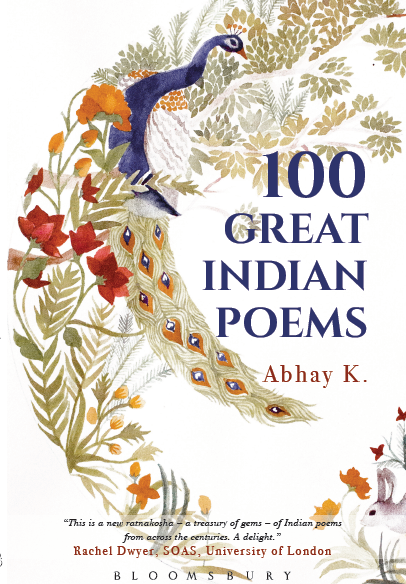ABHAY K.
(From the Editor’s Note)
On 10 December 1950, William Faulkner began his Nobel Prize acceptance speech with these words, “I feel that this award was not made to me as a man, but to my work – a life’s work in the agony and sweat of the human spirit, not for glory and least of all for profit…”
As art transcends the artist, poetry transcends the poet. Faulkner further elaborated upon the importance of artwork over the artist in an interview with The Paris Review in 1956. Referring to the futility of conflict over the authorship of Shakespeare’s works, he contends, “…what is important is Hamlet and A Midsummer Night’s Dream, not who wrote them, but that somebody did. The artist is of no importance. Only what he creates is important.”
This is what I had in mind when I started editing 100 Great Indian Poems and its companion volume 100 More Great Indian Poems. The poetry anthologies I have come across have a clear emphasis on ‘the poets,’ illustrated in the titles such as Ten Twentieth Century Indian Poets, Twelve Modern Indian Poets, Nine Indian Women Poets or 60 Indian Poets. These My Words, edited by Eunice de Souza and Melanie Silgardo, which could be otherwise daunting and inaccessible to common people, may be an exception. These lines from De Souza’s poem ‘Meeting Poets’ are telling –
I am disconcerted sometimes
by the colour of their socks
the suspicion of a wig
the wasp in the voice
and an air, sometimes, of dankness.
Best to meet in poems:
cool speckled shells
in which one hears
a sad but distant sea
A general reader does not need to know which prizes a poet has won, how many books has s/he published or which festivals has s/he attended; the charm and force of an individual poem is sufficient to move the reader. Poetry survives the poets because of its timeless and intrinsic value. Therefore, I don’t understand the obsession of the 20th century anthologists of Indian poetry with the poets.
I was fascinated with Rashmirathi by Ramdhari Singh Dinkar while growing up as a child in Bihar. I chanced upon my father’s worn-out copy of this book at home when I was in class four. The magic that I had felt in the sound and energy of words in Rashmirathi stays with me till date. This Hindi epic tells the story of Karna, Krishna, Pandavas and Kauravas. It was my first lesson in literature as well as in politics and diplomacy. I memorized the third canto by heart as I often read it. I still do. I have unsuccessfully tried to translate this work into English. The magic of native words is lost in translation; and therefore, verses from Rashmirathi do not find a place in the anthology of great Indian poems. For the similar reason of untranslatability of the magic of words, several other great poems, could not fit into this anthology.
Editing 100 Great Indian Poems has been a labour of love for me. I have read widely, almost all poetry anthologies which have been published so far, covering different languages and geographical regions of India. This anthology includes poems from 27 Indian languages viz. Bengali, Bhili, Dogri, English, Gondi, Gujarati, Hindi, Kannada, Kashmiri, Khasi, Kokborok, Konkani, Maithili, Malayalam, Marathi, Nepali, Oriya, Persian, Punjabi, Rajasthani, Sanskrit, Santhali, Sindhi, Tamil, Telugu, Urdu and Prakrit languages including Pali. The canvas of this collection strives to cover over 3000 years of Indian poetry. Interestingly, along with many well-known names, some poets whose great poems are included in the anthology are virtually unknown even in poetry circles. Poems included in this anthology have shades of all rasas (which roughly translates as flavours) including erotic, comic, heroic, horrific among other strains and cover almost all traditions of Indian poetry including bhakti poetry.The distinctive voices of the tribal, dalit, feminist and LGBT communities also find space in this collection.
My purpose of editing 100 Great Indian Poems is to take great Indian poems to the world. This was called for after having brought some of the world’s best poems to India in CAPITALS in 2017. The present anthology of Indian poetry and its companion 100 More Great Indian Poems have been transcreated into Irish by Gabriel Rosenstock. The Portuguese, German and Spanish editions of 100 Great Indian Poems are also in progress.
What makes a poem great? Is there a standard definition of a great poem? I have a simple answer to this question. What moves me is great for me. It could be a painting, a piece of music, a photograph, a poem or anything under the sun. I don’t think there is or there can be a universal definition of greatness. Even Buddha, the enlightened one, advised his followers not to believe what he said without verifying it themselves, not to take his path but to find one’s own. In a similar vein, I would suggest you find your own poems. Make your own anthologies.
This anthology opens with an ancient verse by Bhavabhuti, which, looking over its shoulder, remembers the achievements of past masters but not without offering homage to the language – the vehicle of poetic spirit all over the world. May poetry live on, and languages thrive in our troubled world.
The poems in this collection are arranged in alphabetic order of their respective titles instead of the chronological dates of publication, so as to underline the timeless nature of great poetry. There are a number of great poems I could not include because of my inability to get permissions. These include ‘Self Portrait’ by A.K. Ramanujan, ‘Station Dog’ by Arun Kolatkar, ‘Night of the Scorpion’ by Nissim Ezekiel, ‘Postcard from Kashmir’ by Agha Shahid Ali, ‘The Vaiyai Poems’ from Paripatal, ‘Indigo’ by Chitra Banerjee Divakaruni, ‘One chooses a language’ by Zulfikar Ghose, Bhagavad Gita’sChapter IX translated by Stephen Mitchell, ‘In the Cemetery’ by Karaikkal Ammaiyar, ‘Whatever wound a man inflicts on a woman’ by Vatsyayana, ‘Woman’by Hira Bhansode, ‘The First Book’ by Amrita Pritam, ‘Fear of Death’by Bhartrihari among others.
I read these poems again and again, in times of joy and sorrow; and while reading these, I enter into a world of bliss. I wish you too an unforgettable journey with these 100 Great Indian Poems.
100 Great Indian Poems, first Published 2018 by Bloomsbury India
100 Great Indian Poems available from Amazon at
https://www.amazon.in/100-Great-Indian-Poems-Abhay/dp/9386950936
CAPITALS available from Amazon at http://www.amazon.in/Capitals-Poetry-Anthology-Abhay-K/dp/9386141116
Margutte has published a selection of poems here.


